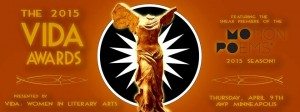 A year and a half ago, inspired by a Words Without Borders dispatch (Where Are the Women in Translation?) by Alison Anderson, I published a blog post on the need to start a prize for women writers in translation, based on the observations many of us were making that women were seriously underrepresented in the major translation prizes. (To be clear, what’s primarily at issue here is the gender of the writers whose work is being translated and selected for translation prizes, rather than that of the translators themselves. Many more women are currently translating than translated.) Katy Derbyshire had just called for establishing a translation prize for women writers in the U.K., and it occurred to me to try to do the same in the U.S. But there was one big structural difference to contend with: the U.K. already had a major literary prize for women writers (the Bailey’s Women’s Prize for Fiction, which has been around for years under several different names). The U.S. did not. And that was strange for a number of reasons, but it also made it strange to be pushing for a women’s translation prize when there wasn’t even a major U.S. prize for women’s writing in English. (The Bailey’s Prize in the U.K. leaves writers of genres other than fiction out in the cold, but at least it’s something.)
A year and a half ago, inspired by a Words Without Borders dispatch (Where Are the Women in Translation?) by Alison Anderson, I published a blog post on the need to start a prize for women writers in translation, based on the observations many of us were making that women were seriously underrepresented in the major translation prizes. (To be clear, what’s primarily at issue here is the gender of the writers whose work is being translated and selected for translation prizes, rather than that of the translators themselves. Many more women are currently translating than translated.) Katy Derbyshire had just called for establishing a translation prize for women writers in the U.K., and it occurred to me to try to do the same in the U.S. But there was one big structural difference to contend with: the U.K. already had a major literary prize for women writers (the Bailey’s Women’s Prize for Fiction, which has been around for years under several different names). The U.S. did not. And that was strange for a number of reasons, but it also made it strange to be pushing for a women’s translation prize when there wasn’t even a major U.S. prize for women’s writing in English. (The Bailey’s Prize in the U.K. leaves writers of genres other than fiction out in the cold, but at least it’s something.)
Fortunately we now have national prizes for women’s literature again, sponsored by the wonderful ladies who brought us the VIDA Count. In fact the first annual 2015 VIDA Award recipients are just being announced this very evening at the AWP in Minneapolis. Wish I was there. So, thanks to VIDA, there’s now a nice, well-publicized U.S. context for a new feminocentric translation prize. Which means it’s time to start working in earnest to organize one. The next step will be at this year’s PEN World Voices Festival, where I’ll be on a panel on May 9 entitled Who We Talk about When We Talk about Translation: Women’s Voices, with VIDA veteran Jen Fitzgerald, Rob Spillman, and Véronique Tadjo, moderated by Margaret Carson (co-chair of the PEN Translation Committee) and Alta Price. We’ll no doubt be discussing the latest numbers and brainstorming what to do about them. If you’re in the NYC area, please come out and help us!
Meanwhile there are some new numbers just in on the U.K. side, painstakingly assembled by the never-flagging Katy Derbyshire, who combed through a variety of publication records to discover that of all the books in translation published in the U.K. in 2013, only a quarter of them were works by women authors. You’ll find her report (and a list of all the books) here. Brava, Katy, and thank you for your Herculean data-gathering and -analyzing labors. (And for those of you near London, Katy will be speaking about this on a panel at the London Book Fair next week.)
And make sure to check back later on the VIDA website to see who this year’s prizewinning women are! (Or, if you’re impatient, click here.)


Thank you for this thoughtful post. I have read your Hermann Hesse translation (Siddhartha). I loved it.
I am based in New Delhi, India. I translate Urdu poetry of Amrita Pritam, a woman poet and writer – a contemporary feminist radical who is popular in India and widely regarded as an iconoclast who blazed a trail of individuality, personal growth and openness, all qualities that are not associated with an Indian woman (unfortunately).
But as times change, her work needs to reach out to larger audiences and wider spaces. I would like support in pursuing this activity, refining my oeuvre (I’m not trained in translation, I merely follow my gut and my sense of the culture and languages in question). Mostly, I would like your guidance.
You may like to check out a sample of my translations of her work on my blog.
Thank you very much